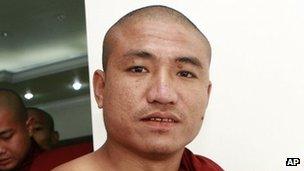Burmese protest leader monk Shin Gambira freed
- Published

Gambira's detention and release comes as Burma's reform process is under increasing scrutiny
Burmese monk Shin Gambira, one of the leaders of anti-government protests in 2007, has been released after briefly being detained by the authorities.
Gambira had been taken from a monastery in Rangoon early on Friday morning, his brother told the BBC.
Officials had said he was merely being questioned and was not charged.
Gambira had been released as part of an amnesty last month, but continued his criticism of the civilian, military-backed government.
The US State Department had expressed concern over his latest detention.
Hard labour
One of the leaders of the All-Burmese Monks Alliance, the 31-year-old was arrested in November 2007, weeks after the monk-led ''saffron revolution'' protests were crushed.
Less than three weeks later, he was jailed for 68 years, including 12 of hard labour.
He was one of 651 people freed on 13 January in what was the most significant release of political prisoners since the country began a series of reforms aimed at encouraging the lifting of sanctions imposed by the European Union and United States.
But after his release, Gambira reportedly began re-opening monasteries that were locked up by the authorities since the protests.
In interviews, he expressed deep scepticism about reforms taking place in Burma, says the BBC's Rachel Harvey in Burma.
An EU official is due to visit Burma on Saturday to offer 150m euros ($199m, £126m) in aid following the series of recent reforms.
Andris Piebalgs, the European Union development commissioner, will meet with President Thein Sein as well as pro-democracy opposition leader Aung San Suu Kyi, who is contesting upcoming by-elections.